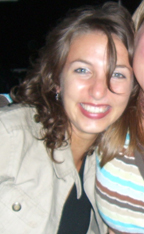
Anthropology (and
Latin American Studies)
Graduate Student Amy Brown
As my experience mentoring Brandon Hunter, an undergraduate in Anthropology and Latin American Studies, comes to a close, I have only positive things to say about the experience. At the beginning of the semester, I was unsure about what to expect from Brandon, or what my role would be in supporting him through his project. I am a first-year doctoral student in Anthropology, and my research deals with language and literacy, race, and teaching for social justice. I hoped that I would be able to provide the kind of support that Brandon sought for his ethnographic project, which was an exploration of race and gender performance in an all-female spirit and service organization at UT. As the semester progressed, my role became more and more well defined. Largely, Brandon took the initiative on his work. I was able to help him flesh out some of the theoretical and methodological questions that came up as he gathered ethnographic data and did research.
Our bi-weekly meetings over coffee helped to establish a personal relationship, as well as a working relationship, where in addition to Brandon's research questions, my own research questions evolved, changed, and became more refined.
Watching Brandon's research questions grow and change was incredibly powerful. At the beginning of the semester, he wanted to explore Whiteness in the spirit and service organization, and so he asked an organization which he assumed to be mostly White if, through interviews and regular observations of their meetings, he could conduct his research. Yet surprisingly, when he began to conduct the interviews, he found that 30% of the group members self-identify as women of color, and that eleven out of the twenty-five women of color in the group hold leadership roles in the organization. Rather than being overwhelmingly racially homogenous, as Brandon had expected, the group was actually quite diverse. Therefore, the way that he was framing and exploring 'race' in his methodology changed. Through this necessary change in his research, Brandon honed some of the skills that are necessary to an anthropologist in terms of beginning research with a general goal - and subsequently coming across unexpected data that necessitates some form of methodological or theoretical flexibility.
Brandon's question evolved to look more at the ways that agents socially negotiate and perform identity in relation to race and gender. He writes in his research prospectus, "Even while aspects of our research are socially constructed (race, class, gender etc.), our uniquely situated selves bend, and sometimes deconstruct the unstable expectations that underlie these constructs." He asserts that the organization he researched, because it does not explicitly bring race or ethnicity to the forefront of its membership requirements, actually gives women an opportunity to play with constructing hybrid, complex identities in a diverse space, and to interrogate the race and gender-based assumptions that are made about them as members of a UT spirit group. In addition to this work, Brandon and I also took the opportunity to travel together to Chicago, where we attended a graduate student conference on race at the University of Chicago. I presented a paper at the conference, and both Brandon and I were able to make important connections with graduate students around the U.S. whose research interests aligned with ours. This trip, made possible by funding from the IE internship, was a high point of my semester as well as Brandon's.
This mentoring relationship has been an overwhelmingly positive experience. Brandon and I have learned from each other, and as the semester has progressed, have experienced growth and change as our research questions have evolved. We have evaluated and talked through our current respective academic work, as well as our future plans. This has been mutually beneficial.
